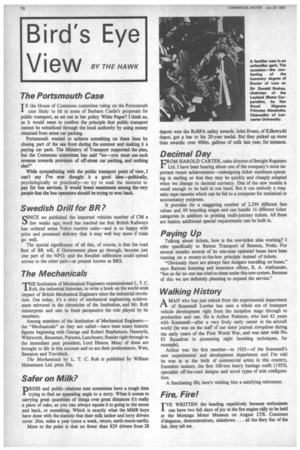Bird's Eye
Page 78

If you've noticed an error in this article please click here to report it so we can fix it.
View BY THE HAWK
The Portsmouth Case
T S the House of Commons committee ruling on the Portsmouth case likely to hit at some of Barbara Castle's proposals for public transport, as set out in her policy White Paper? I think so, as it would seem to confirm the principle that public transport cannot be subsidized through the local authority by using money obtained from street car parking.
Portsmouth wanted to achieve something on these lines by closing part of the sea front during the summer and making it a paying car park. The Ministry of Transport supported the plan, but the Commons committee has said "no—you must use such revenue towards provision of off-street car parking, and nothing else!"
While sympathizing with the public transport point of view, I can't say I've ever thought it a good idea—politically, psychologically or practically—to try to soak the motorist to pay for bus services. It would breed resentment among the very people that the bus operators should be trying to woo back.
Swedish Drill for BR?
SINCE we published the imported vehicles number of CM a few weeks ago, word has reached me that British Railways has ordered some Volvo tractive units—and is so happy with price and promised delivery that it may well buy more if trials go well.
The special significance of all this, of course, is that the road fleet of BR will, if Government plans go through, become just one part of the NFO; and the Swedish inffitration could spread across to the other part—at present known as BRS.
The Mechanicals
HE Institution of Mechanical Engineers commissioned L. T. C. 1 Rolt, the industrial historian, to write a book on the world-wide impact of British Mechanical Engineers since the industrial revolution. Out today, it's a story of mechanical engineering achievement mirrored in the chronicles of the Institution, and Mr. Roll reinterprets and sets in fresh perspective the role played by its members.
Among members of the Institution of Mechanical Engineers— the "Mechanicals" as they are called—have been many historic figures beginning with George and Robert Stephenson, Nasmyth, Whitworth, Bessemer, Parsons, Lanchester, Stanier right through to the immediate past president, Lord Hinton. Many of these are brought to life in this account and so are their predecessors, Watt, Smeaton and Trevithick.
The Mechanicals by L. T. C. Rolt is published by William Heinemann Ltd. price 30s.
Safer on Milk?
DRESS and public relations men sometimes have a tough time -Itrying to find an appealing angle to a story. When it comes to carrying great quantities of things over great distances it's really a piece of cake, as you can always equate it to going to the moon and back, or something. Which is exactly what the MMB boys have done with the statistic that their milk tanker and lorry drivers cover 26m. miles a year (once a week, return, earth-moon-earth).
More to the point is that no fewer than 829 drivers from 28 depots won the RoSPA safety awards. John Evans, of Kilkewydd depot, got a bar to his 20-year medal. But they picked up more than awards: over 400m. gallons of milk last year, for instance.
Decimal Day
EIROM HAROLD CARTER, sales director of Setright Registers Ltd. I have been hearing about one of the company's most important recent achievements—redesigning ticket machines operating in sterling so that they may be quickly and cheaply adapted when we change to decimal currency. One of the new models is small enough to be held in one hand. But it can embody a magnetic tape cassette which can be fed to a computer for statistical or accountancy purposes.
It provides for a staggering number of 2,399 different fare values and 99 boarding stages and can handle 16 different ticket categories in addition to printing multi-journey tickets. All these are basics; additional special requirements can be built in.
Paying Up
Talking about tickets, how is the non-ticket idea working? I refer specifically to Barton Transport of Beeston, Notts. For several months several of its one-man operated buses have been running on a money-in-the-box principle instead of tickets.
"Obviously there are always fare dodgers travelling on buses," says Bartons licensing and insurance officer, R. A. Alefounder, "but so far no one has tried to cheat under this new system. Because of this we are definitely planning to expand the service."
Walking History
AMAN who has just retired from the experimental department of Scarnmell Lorries has seen a whole era of transport vehicle development right from the inception stage through to production and use. He is Arthur Puleston, who had 42 years with Scammell—after a very lively early career in the aircraft world (he was on the staff of our sister journal Aeroplane during the early years of the First World War, and was later with No. 83 Squadron in pioneering night bombing techniques, for example).
Arthur was the first member—in 1925—of the Scammell's new experimental and development department and I'm told he was in at the birth of commercial artics in this country, frameless tankers, the first 100-ton heavy haulage outfit (1929), specialist off-the-road designs and novel types of axle configuration.
A fascinating life; here's wishing him a satisfying retirement.
Fire. Fire!
rvE WRITTEN the heading repetitively because enthusiasts I can have two full days of joy at the fire engine rally to be held at the Montagu Motor Museum on August 27/8. Concours d'elegance, demonstrations, sideshows. . . all the fiery fun of the fair, they tell me.




































































































































































